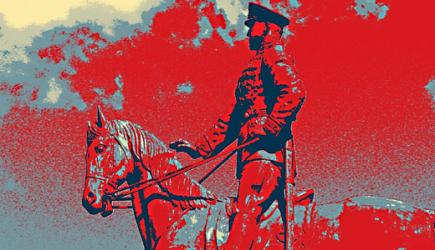
“Political art is a great avenue to capture the imaginations of today’s people,” said artist Al Heuer, whose neo-Marxist pop art draws inspiration from around the world. Speaking with the People’s World, he provided an in-depth perspective on the important role and influence of art – and explained how politics become an important part of that.
“I have always, in my heart, been a Marxist,” said Heuer, who, after spending much of the 2000’s capturing photos of nature and wildlife, began to pursue an artistic path that was much more closely related to his outlook.
“I live in a very liberal area of Denver, Colorado,” Heuer explained. “And yet, out here, there’s not much of a political message in art. A lot of galleries want to play it ‘safe;’ they wouldn’t want to jazz things up with something a little controversial.” And propaganda, he said, is perhaps just the controversy some people need in order to wake up from their apathy. “Propaganda can be used for good,” he said, “not just for bad [purposes]. It can educate and uplift.”
Heuer, whose mother was a painter, studied art in college. He started his work in political mixed media art by photographing the effects of the Great Recession; homelessness, for example. He also documented the Occupy movement, which “became a great source of inspiration, and saw the merging of art, photography, and politics; it all really came together.”
So what, exactly, is ‘neo-Marxist’ pop art?
“I say neo-Marxist,” he said, “as in, ‘taking a fresh, modern look at Marxism.’ I believe the time is ripe for a revitalization of Marxism in the U.S.” On why he calls his pieces ‘pop art,’ he said, “Pop art is a nod to the work of [80’s artist] Andy Warhol. It also is a term that lightens up the message behind my work.”
The contrasting reds and blues of the art draw people in, he noted, whereas dark photos that evoke feelings of poverty and decay could push people away. The pieces also draw inspiration from old Soviet Russia communist propaganda posters. “This is my salute to [those posters],” he said. “They’ve almost been forgotten as a form of art.”
 Pop art is made by taking a photograph, removing areas of it, and editing the entire image on a computer. Various Photoshop effects are implemented to achieve the final piece of art. ” Certain effects can capture an emotion that might not have been present in the original photo,” said Heuer. That’s important, because “art has to move people. It has to evoke a reaction.”
Pop art is made by taking a photograph, removing areas of it, and editing the entire image on a computer. Various Photoshop effects are implemented to achieve the final piece of art. ” Certain effects can capture an emotion that might not have been present in the original photo,” said Heuer. That’s important, because “art has to move people. It has to evoke a reaction.”
Heuer, a self-described history buff, also takes influence from important historical figures, including Lenin, Mao, John Reid, and Emma Goldman. “They are the reasons why I became a communist,” he remarked.
Heuer further explored communist history when he traveled to China and Russia – places that both provided key opportunities for taking excellent pictures. He spent May Day in Moscow, in fact, where he marched with 50,000 fellow communists and took part in demonstrations against Vladimir Putin.
At the end of the day, Heuer does what does because, when it comes to political activism, “What better way [to take part in it] than through photography and painting?
“Corporations and capitalism have dumbed down art. It’s harder to get a message out there today, but it’s still possible. I hope it inspires people to ditch the apathy.”
“I deeply believe in the causes of the working class,” Heuer concluded. And anyway, he added, “I’m from the working class!”
Al Heuer’s work is available at http://www.redarmyart.com
Photos: “Rise of the Worker II” and “Red Army Commander” – both pieces by Al Heuer; used with permission.











